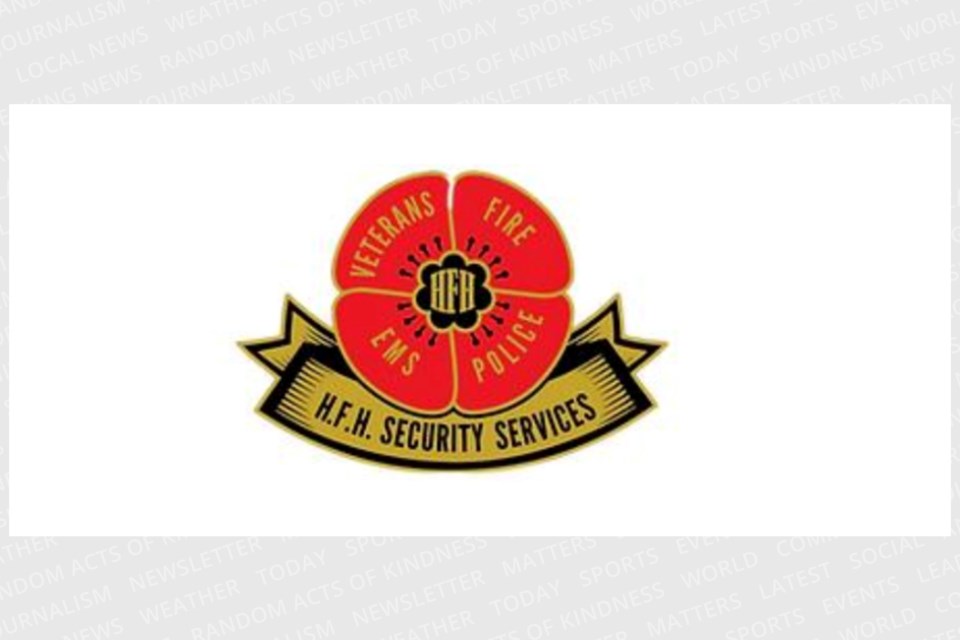A small business owner and retired combat veteran says he's feeling “gobsmacked” after receiving a letter from a lawyer representing the Royal Canadian Legion’s Dominion Command demanding he change his poppy-based logo.
John Donoghue, owner of HFH Security Services in Angus, said he initially received an email from a legion representative on Feb. 2 — the day after a story on his business was published on BarrieToday about how it hires veterans and retired first-responders to provide security services — informing him he's not allowed to use his company logo, which they claim contains an image of a poppy and therefore infringes on the organization’s copyright.
“I didn’t think anything of it and I left it,” he said.
Four days later, on Feb. 6, he says he then received a cease-and-desist letter from a law firm representing the legion.
“The image I got (for the logo) was from a free image site and it was based on a red rose that my grandfather used to give to my Nan every day of his life before she passed away," Donoghue said. "For me, it was more of a sentimental image than it was a poppy.
"It comes across that any flower that is red they’re deeming is a poppy," he added.
Donoghue says he received a subsequent letter from lawyers for the legion, dated Feb. 14, acknowledging they were aware that he’d changed the business logo, but noting they could still see the see “the offending trademark incorporating a poppy insignia still appears in the lower right-hand corner of a video” on his website. Also, the letter noted, the hoodie he's wearing in the video also bears the image.
The letter noted his blog also still showed the poppy image.
“Please let us know once the video has been removed from the website and once the offending trademark has been removed from all promotional material," stated the letter. "Furthermore, please confirm once all promotional items incorporating the offending logo, including clothing, have been destroyed. We will then prepare a written undertaking for execution by your company. Your company will confirm in the undertaking that all infringing conduct has ceased and that it will not use trademarks confusing with the legion’s marks in the future.”
In an email, Nujma Bond, a national spokesperson for the Royal Canadian Legion, said the poppy is a trademarked image.
“Most organizations take their copyrighted images seriously. The poppy is part of the legion’s identity and a strong symbol of remembrance," Bond said. "It is key to raising funds during our annual National Poppy Campaign, to help support our veterans, their families, and communities.”
The legion, she added, was granted oversight of this symbol by an Act of Parliament many years ago. The organization has a duty to protect the symbol from misuse and so that its meaning is not "diluted or disrespected," and not used by anyone who may be trying to make a profit or using it for commercial reasons.
“We understand that sometimes individuals or organizations don’t realize the poppy is a trademarked image, and mistakes can happen inadvertently. We first try to educate," Bond said.
While the legion often approves use of the image by organizations or individuals, Bond said Donoghue’s use of the poppy was not approved by the legion, nor does it fall within the acceptable guidelines for its use.
“We look at parameters such as size, scope and type of project or use that is planned, whether it’s a remembrance-related initiative, a profit-making endeavour, or whether funds will be directed to the legion for its support work for veterans," Bond said. "As mentioned, we contacted Mr. Donoghue to explain and educate, without response. We appreciate Mr. Donoghue’s service and good actions to help others and we wish him well in that regard.”
Despite using the logo for the last two years, Donoghue said he has now changed it, as he doesn’t want other veterans to think he's being disrespectful, but he says he is taking issue with the legion’s claim that he is making a profit off of the poppy image.
“My issue is it’s not the logo that makes the profit. It’s me physically giving up my family time to do the work a client requests," he said. "It’s got nothing to do with a logo and I have it mandated with our company that a percentage of what we make from a client gets paid back to the foundations that support veterans and retired first-responders.
"We were making payments to help support these guys, plus we are employing these guys. I wasn’t being disrespectful," Donoghue added. "I just think it’s unfair … that you can go on Amazon and find pages of things with poppies, and they don’t get a cease-and-desist letter, but a small business run by a combat veteran is given (one)."
Bond says Donoghue's assertion that online retailers don't face similar scrutiny is "incorrect."
"The legion does combat online violations regularly and in a similar manner where necessary," she said. "It’s not a straightforward or easy process and, unfortunately, action is not always taken expeditiously."
The whole experience, Donoghue said, has left him feeling “disgusted” and “gobsmacked."
“It feels like a slap in the face. I served my country — yes, I served the U.K. — but I have handed business cards to people in the legion, including the president of the legion and nobody had an issue with it," he said.


